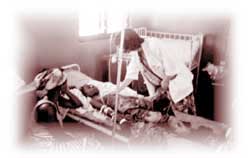Miracle in Ghana

Henry was just fine the day before, but that morning he woke with a fever and bad headache. As he got worse, his parents and he started on the long journey to Margaret Marquart Hospital, a trip of several hours in crowded public minibuses over dusty, bumpy, poorly paved roads, then a canoe ride across the Volta River, and another bus ride. Headache and fever usually means malaria in many tropical countries. Malaria can just make you feel really awful for awhile…or it can kill you. For Henry, the second possibility was looking more and more likely. He was becoming increasingly unresponsive along the journey. By the time he reached the hospital, he was in a coma. When I saw him, he barely responded to a painful knuckle rub of his sternum (breast bone) and he had a very stiff neck.
Severe cerebral malaria and bacterial meningitis can presen all the same signs and symptoms, can be extremely difficult to tell apart, and both are deadly. A blood smear for the malaria parasite may help, but I’ve found even the kids admitted for overnight observation of a newly casted broken bone will many times have a positive smear the next day (due to stressing the system perhaps). I attempted to perform a spinal tap, but the sample came out bloody so I couldn’t tell if the cerebral spinal fluid was clear like water or cloudy, a telltale sign of meningitis; and our lab was incapable of doing any kind of culture. The obvious choice, but an expensive and sometimes impossible one for these people, was to treat both possibilities. Quinine is hard to obtain in Ghana so we rarely had it at Margaret Marquart, but that day we did. We also had IV ampicillin but no chloramphenical or gentimicin. We gave what we could and waited. When I went to check on Henry about two hours later, my heart sank as I listened to his slow ragged breathing. The only times I’ve heard that particular type of breathing, the child was dead in a few hours. There was only one other thing I could think of to do for him and his family. I asked the family if they were Catholic. They weren’t, but they were open to having the parish priest who said daily Mass for the hospital come to pray with them. It was late at night and a long, dark, muddy walk for him, but the parish priest came willingly. While he was there, he blessed the other three children in the room (no private ICU beds here!): Courage, who had a broken femur and most of his skin torn from his back in an accident when a truck hit him and dragged him a ways, Godwin, a fifteen year old with an unbeatable spirit and will to live and a failing heart about to beat its’ last with no hope of a transplant in a country that couldn’t even provide any potassium salt supplement, and Gifty, a very sweet, very sick little four-year-old girl who had just been diagnosed with AIDS.
I went to bed that night fairly sure the problem of Henry would sadly be solved by morning. Early the next morning, I hurried to the Children’s Ward and peeked in Room 2. Henry was still there! Better yet, over the next day and a half, he came out of his coma, speaking, recognizing his parents, essentially normal neurologically. What I thought was certain death had been blessed and transformed to life after the Anointing of the Sick and God’s intervention. My month in Ghana was up the next day, but I returned home humbled and thankful for the presence of God in our lives. He doesn’t always save our lives in this world (Godwin died the next week) but He does give us the love and support most needed for the health of each soul in its own uniqueness.
